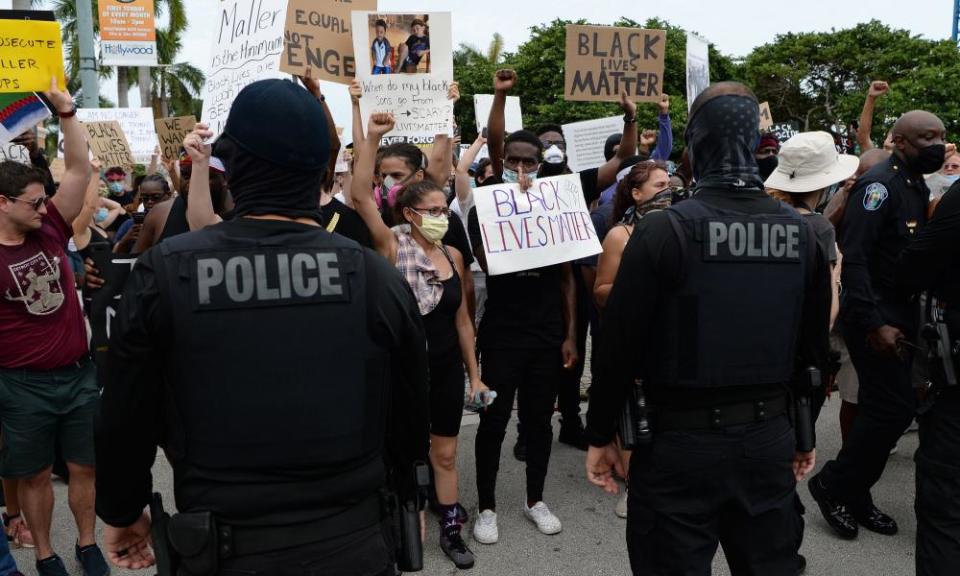Florida passes ‘anti-riot’ bill as civil rights groups warn it will stifle dissent

Florida has approved a so-called “anti-riot” bill that gives harsher penalties to protesters, handing a victory to the state’s Republican governor and dealing a blow to civil rights groups who warn it will stifle dissent.
The bill, passed by the state’s Republican-controlled legislature on Thursday, includes stiffer punishment for crimes committed during a riot or violent protest. It would allow authorities to hold arrested protesters until a first court appearance, and it would establish new felonies for organizing or participating in a violent demonstration.
The proposal would make it a second-degree felony to destroy or demolish a memorial, plaque, flag, painting, structure or other object that commemorates historical people or events. That would be punishable by up to 10 years in prison.
It would also strip local governments of civil liability protections if they interfere with law enforcement’s efforts to respond to a violent protest, and it adds language to state law that could force local governments to justify a reduction in law enforcement budgets.
Related: America's protest crackdown: five months after George Floyd, hundreds face trials and prison
State Republicans have argued the bill is about “law and order” and preventing violence. Its approval is a major legislative victory for the governor, Ron DeSantis, who began campaigning for the measure last year following a summer of nationwide protests over racism and police brutality against Black Americans.
But critics have called the legislation an assault against the Black Lives Matter movement, as well as an attempt to curtail the right to free speech and to peaceably assemble.
Indeed, the genesis of the measure dates back to a 21 September press conference held by the governor, in which he was joined by the state senate president, Wilton Simpson, and house speaker, Chris Sprowls, to condemn the unrest in cities across the country and what he referred to as attacks on law enforcement.
After the bill’s final passage, DeSantis said he looked forward to signing the measure into law.
“This legislation strikes the appropriate balance of safeguarding every Floridian’s constitutional right to peacefully assemble, while ensuring that those who hide behind peaceful protest to cause violence in our communities will be punished,” the governor said in a statement.
The measure drew intense reactions over the months, as community activists gathered in the state capitol to implore lawmakers to turn down the effort.
The American Civil Liberties Union said the new law would give police broad discretion over what constitutes a demonstration and a riot.
“The bill was purposely designed to embolden the disparate police treatment we have seen over and over again directed towards Black and brown people who are exercising their constitutional right to protest,” said Micah Kubic, the executive director of ACLU of Florida.
Christina Kittle, an organizer of the Jacksonville Community Action Committee, warned that the new law could escalate clashes between police and demonstrators.
“It’s been a blow to our morale, for sure,” she said. “I’m not sure it’s going to be a setback, but this was created to intimidate people and to keep people from coming out.”
Senator Darryl Rouson, a former St Petersburg chapter president of the NAACP who joined every Democrat and a lone Republican in voting down the bill, said the new law would not deter anyone from protesting a just cause.
“This is not going to stop people from rising up,” Rouson said.
“This won’t stop anything, except those who are afraid. I’m not afraid,” he said. “I just want to say to people, keep on knocking, keep on protesting, keep on rising in spite of an attempt to stifle voices.”

 Yahoo Movies
Yahoo Movies 